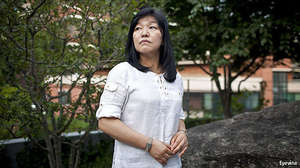Kyung-Sook Shin in Seoul of 1980, 1990.
SINCE the Korean War, Western writing on Korea has focused mostly on the contrast between North and South. But the past sixty years include a number of heartbreaking and overlooked stories of the South, a poor agrarian state that quickly transformed into an industrial powerhouse, and a dictatorial "democracy" that evolved into a sound republic.
Kyung-Sook Shin, both the only Korean and the only woman to win the Man Asian Literary Prize, is also the only author whose novels of those lost Korean decades have broken through as bestsellers to international audiences. In her three translated works--"Please Look After Mom", "I'll Be Right There" and her forthcoming novel, "The Girl Who Wrote Loneliness" (released by Pegasus Books on September 15)--Ms Shin opens her nation's transition and her people's struggle to the world that looked away for all those years.
"Please Look After Mom", Ms Shin's poignant examination of of how Korea's evolution has impacted the different generations, gave birth to these other translations. But her later works are still more profound. They describe South Korea in the 1970s and 1980s, when workers fought to unionise against intolerable factory conditions, and a youth movement faced a bloody government crackdown to fight for democracy. It was these turbulent times and dark places that birthed the writer in Ms Shin.
